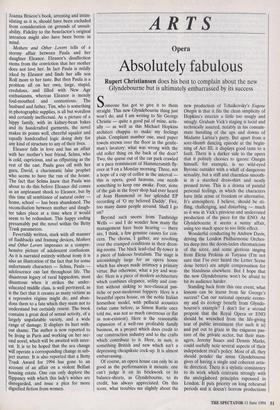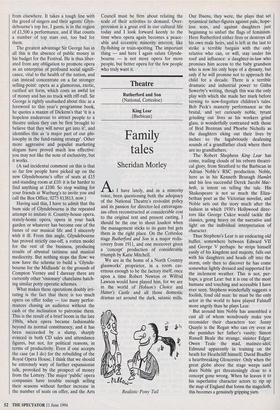ARTS
Opera
Absolutely fabulous
Rupert Christiansen does his best to complain about the new Glyndebourne but is ultimately embarrassed by its success Someone has got to give it to them straight. This new Glyndebourne thing just won't do, and I am writing to Sir George Christie — quite a good pal of mine, actu- ally — as well as this Michael Hopkins architect chappie to make my feelings plain. Complaint number one, used paper towels strewn over the floor in the gentle- man's lavatory: what was wrong with the old roller thing on the back of the door? Two, the queue out of the car park crawled at a pace reminiscent of Hammersmith fly- over at 9 on a Monday morning. Three, not a hope of a cup of coffee in the interval this is opera, good heavens, one needs something to keep one awake. Four, none of the gals in the foyer shop had ever heard of Joan Hammond or her splendid EP recording of '0 my beloved Daddy'. Five, too many damn people around. Shall I go on?
Beyond such snorts from Tunbridge Wells — and I do wonder how many the management have been hearing — there are, I think, a few genuine causes for con- cern. The chorus, I gather, are revolting over the cramped conditions in their dress- ing-rooms. The black lead-clad fly-tower is a piece of hideous brutalism. The stage is astonishingly large for an opera house which has always made intimacy a primary virtue. But otherwise, what a joy and won- der. Here is a piece of modern architecture which combines elegance, utility and com- fort without sinking to neo-classical pas- tiche or post-modernist frippery. Here is a beautiful opera house, on the noble Italian horseshoe model, with pellucid acoustics (what came before, as Simon Rattle once told me, was not so much cavernous or flat as non-existent). Here is the reasonable expansion of a well-run profitable family business, in a project which does credit to our construction industry and to the crafts which contribute to it. Here, in sum, is something British and new which isn't a depressing cheapskate cock-up. It is almost embarrassing.
Of course, an opera house can only be as good as the performances it mounts: one can't judge it on its brickwork or its balance-sheets, as Glyndebourne, to its credit, has always appreciated. On this score, what troubles me slightly about the new production of Tchaikovsky's Eugene Onegin is that it fits the clean simplicity of Hopkins's interior a little too snugly and smugly. Graham Vick's staging is lucid and technically assured, notably in his consum- mate handling of the ups and downs of Madame Larina's party. But apart from a sore-thumb dancing episode at the begin- ning of Act III, it displays good taste to a fault. There is a darker side to the opera that it politely chooses to ignore: Onegin himself, for example, is no wild-eyed Byronic outsider with a whiff of dangerous sexuality, but a stiff and charmless smooth- ie in a starched dress-shirt and neatly pressed trews. This is a drama of painful personal feelings, in which the characters have little sense of freedom or alternative. It's atmosphere, I believe, should be sti- fling, challenging, and disturbing — much as it was in Vick's previous and underrated production of the piece for the ENO. At Glyndebourne it seems a sunny affair, using too much space to too little effect.
Wonderful conducting by Andrew Davis, driving the London Philharmonic Orches- tra deep into the doom-laden chromaticism of the score, and some glorious singing from Elena Prokina as Tatyana (I'm not sure that I've ever heard the Letter Scene done better) are ample compensation for the blandness elsewhere. But I hope that the new Glyndebourne won't be afraid to hit its audience harder.
Standing back from this one event, what lessons can be learnt from Sir George's success? Can our national operatic econo- my and its ecology benefit from Glynde- bourne's example? I don't for a second propose that the Royal Opera or ENO should be wrenched from the life-giving teat of public investment (for such it is) and put out to graze in the exiguous pas- ture of the private sector, but their man- agers, Jeremy Isaacs and Dennis Marks, could usefully note several aspects of their independent rival's policy. Most of all, they should ponder the sense Glyndebourne gives of having a single and coherent artis- tic direction. There is a stylistic consistency to its work which contrasts strongly with the smorgasbord principles espoused in London. It puts priority on long rehearsal periods and it doesn't borrow productions from elsewhere. It takes a tough line with the greed of singers and their agents: Glyn- debourne's top fee, I guess, is in the region of £1,500 a performance, and if that counts a number of top stars out, too bad for them.
The greatest advantage Sir George has in all this is the absence of public money in his budget for the Festival. He is thus liber- ated from any obligation to promote opera as an enterprise of profound social signifi- cance, vital to the health of the nation, and can instead concentrate on a far stronger selling-point: opera as a glamorous, exotic, rarified art form, which costs an awful lot of money and has no truck with riff-raff. Sir George is rightly unabashed about this: in a foreword to this year's programme book, he quotes a maxim of Dickens's that 'it is a hopeless endeavour to attract people to a theatre unless they can be first brought to believe that they will never get into it', and identifies this as 'a major part of our phi- losophy in the fund-raising strategy'. Other more aggressive and populist marketing slogans have proved much less effective: you may not like the note of exclusivity, but it works.
(A sad incidental comment on this is that so far few people have picked up on the new Glyndebourne's offer of seats at £15 and standing room at £10: it is far harder to find anything at £100. So stop waiting for your friends at Warburg's to invite you and call the Box Office, 0273 813813, now.) Having said this, I have to admit that the bum side of Glyndebourne is the repeated attempt to imitate it. Country-house opera, stately-home opera, opera in your back garden or whatever has become one of the banes of our musical life and I sincerely wish it ill. From this angle, Glyndebourne has proved strictly one-off, a rotten model for the rest of the business, producing results of abysmal tattiness and musical mediocrity. But nothing stops the flow: we now have the scheme to build a `Glynde- bourne for the Midlands' in the grounds of Compton Verney and I daresay there are currently other 'visionary' chatelains hatch- ing similar potty operatic schemes.
What makes these operations doubly irri- tating is the fact that there is too much opera on offer today — too many perfor- mances chasing an audience without the cash or the inclination to patronise them. This is the result of a brief boom in the late 1980s, when opera became fashionable beyond its normal constituency, and it has been succeeded by a slump, sharply evinced in both CD sales and attendance figures, but not, for political reasons, in terms of productivity. Even if one accepts the case (as I do) for the rebuilding of the Royal Opera House, I think that we should be extremely wary of further expansionist talk, provoked by the prospect of money from the Lottery. The major 'public' opera companies have trouble enough selling their seasons without further increase in the number of seats on offer, and the Arts Council must be firm about relating the scale of their activities to demand. Over- provision is a great evil in our cultural life today and I look forward keenly to the time when opera again becomes a peace- able and eccentric minority interest, like fly-fishing or train-spotting. The important thing -- and here I again salute Glynde- bourne — is not more opera for more people, but better opera for the few people who truly want it.



































































 Previous page
Previous page